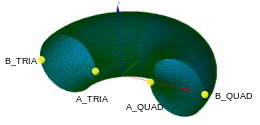4. B modeling#
4.1. Characteristics of modeling#
We use a DST model.

4.2. Characteristics of the mesh#
The mesh contains 7260 knots and 10800 meshes including:
7200 TRIA3 meshes,
3600 QUAD4 meshes.
4.3. Tested sizes and results#
Travel
Identification |
Reference type |
Reference value |
Tolerance \(\text{(\%)}\) |
|
Point |
Size |
|||
\(A\text{\_}\mathit{QUAD}\) |
\(\mathit{DX}\) |
“ANALYTIQUE” |
\({\delta }_{r}\mathrm{=}1.19\mathrm{\times }{10}^{\mathrm{-}7}m\) |
\(3.0\) |
\(A\text{\_}\mathit{TRIA}\) |
“ANALYTIQUE” |
\({\delta }_{r}\mathrm{=}1.19\mathrm{\times }{10}^{\mathrm{-}7}m\) |
\(2.0\) |
|
\(B\text{\_}\mathit{QUAD}\) |
“ANALYTIQUE” |
\({\delta }_{r}\mathrm{=}1.79\mathrm{\times }{10}^{\mathrm{-}6}m\) |
\(1.5\) |
|
\(B\text{\_}\mathit{TRIA}\) |
“ANALYTIQUE” |
\({\delta }_{r}\mathrm{=}1.79\mathrm{\times }{10}^{\mathrm{-}6}m\) |
\(1.5\) |
|
Constraints
Identification |
Reference type |
Reference value |
Tolerance \(\text{(\%)}\) |
|
Point |
Size |
|||
\(A\text{\_}\mathit{QUAD}\) |
\(\mathit{SIXX}\) |
“ANALYTIQUE” |
\(7.5\mathrm{\times }{10}^{5}\mathit{Pa}\) |
\(5.0\) |
\(A\text{\_}\mathit{TRIA}\) |
“ANALYTIQUE” |
\(7.5\mathrm{\times }{10}^{5}\mathit{Pa}\) |
\(5.0\) |
|
\(B\text{\_}\mathit{QUAD}\) |
“ANALYTIQUE” |
\(4.17\mathrm{\times }{10}^{5}\mathit{Pa}\) |
\(3.0\) |
|
\(B\text{\_}\mathit{TRIA}\) |
“ANALYTIQUE” |
\(4.17\mathrm{\times }{10}^{5}\mathit{Pa}\) |
\(3.0\) |
|
Identification |
Reference type |
Reference value |
Tolerance \(\text{(\%)}\) |
|
Point |
Size |
|||
\(A\text{\_}\mathit{QUAD}\) |
\(\mathit{SIYY}\) |
“ANALYTIQUE” |
\({\sigma }_{11}\mathrm{=}2.5\mathrm{\times }{10}^{5}\mathit{Pa}\) |
\(12.0\) |
\(A\text{\_}\mathit{TRIA}\) |
“ANALYTIQUE” |
\({\sigma }_{11}\mathrm{=}2.5\mathrm{\times }{10}^{5}\mathit{Pa}\) |
\(12.0\) |
|
\(B\text{\_}\mathit{QUAD}\) |
“ANALYTIQUE” |
\({\sigma }_{11}\mathrm{=}2.5\mathrm{\times }{10}^{5}\mathit{Pa}\) |
\(4.0\) |
|
\(B\text{\_}\mathit{TRIA}\) |
“ANALYTIQUE” |
\({\sigma }_{11}\mathrm{=}2.5\mathrm{\times }{10}^{5}\mathit{Pa}\) |
\(4.0\) |
|